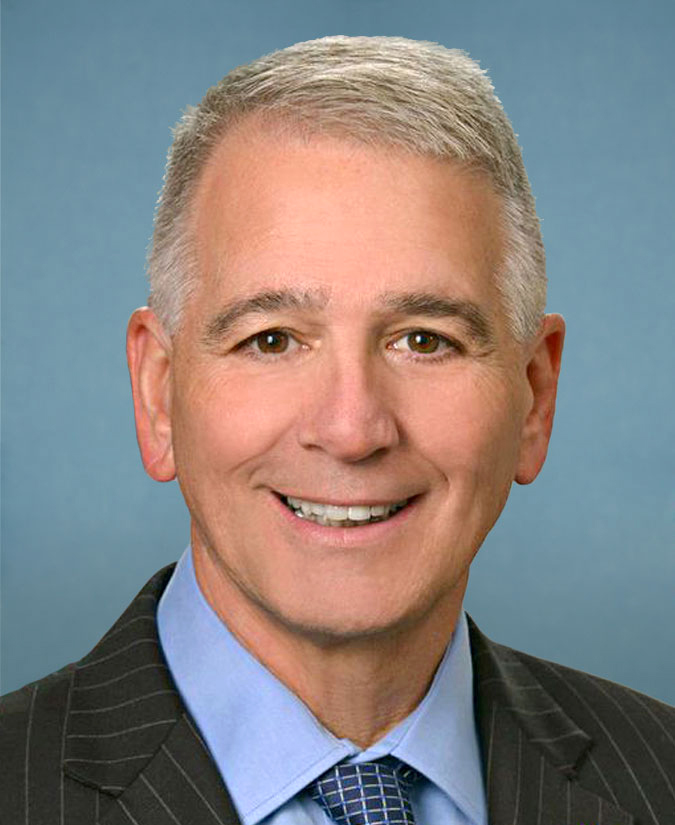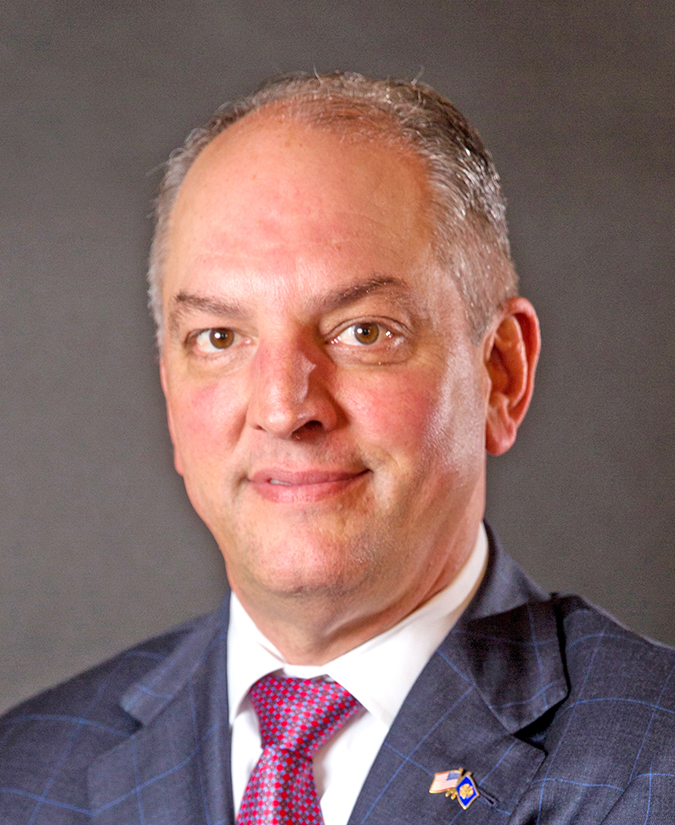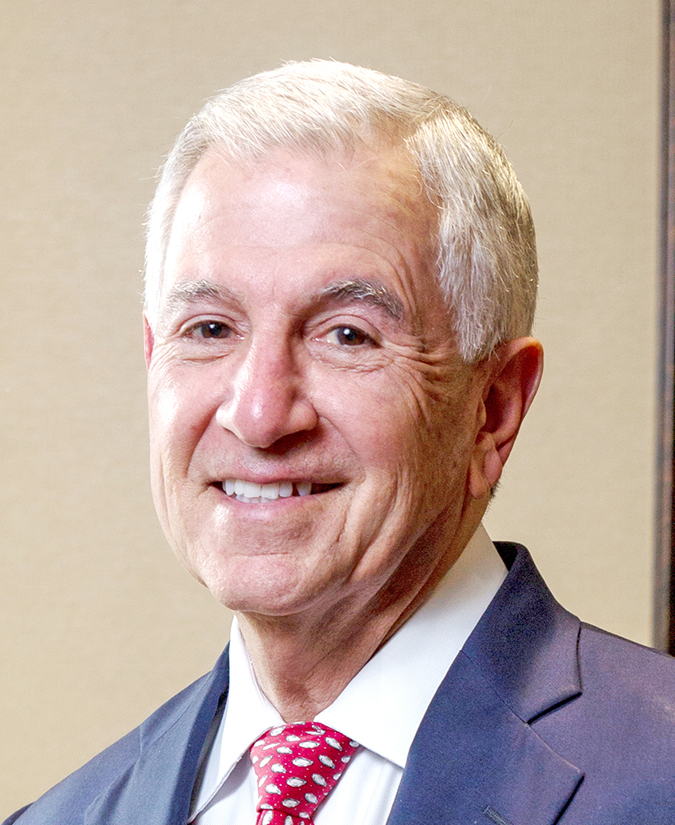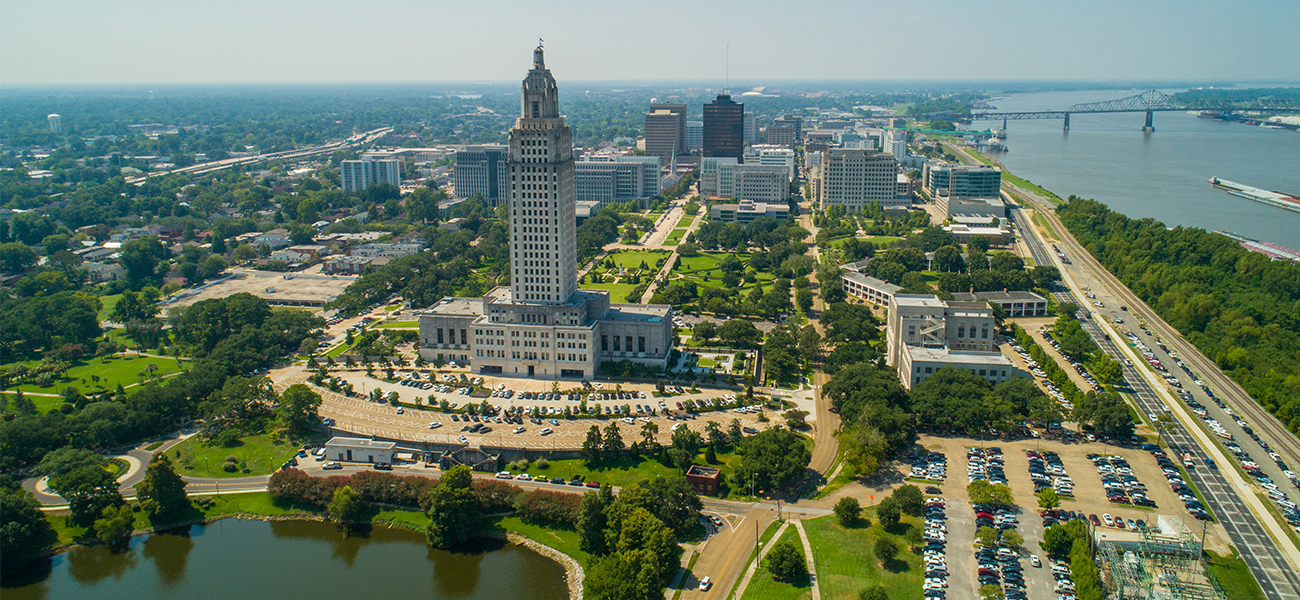
The top three candidates for Louisiana governor: We asked the questions, they answered
In late August, the 225 team sent out a questionnaire to the top three candidates for governor. We asked eight questions about important issues facing the state. Their answers to four of those questions are in these pages, and we hope they will shed some light on each candidate and his platforms. The answers to the other four questions—about education, climate change, crime and the St. George proposal—can be found below.
Read on, and consider their answers. Then be sure to vote in the primary elections Oct. 12!
Read our 2019 election guide here!
|
|
THE CANDIDATES
Based on fundraising and early polling, we asked the three major candidates to participate in this questionnaire.
Ralph Abraham (R)
Currently serving his third term in Congress representing District 5, which covers much of the northeastern and central portions of Louisiana.
Gov. John Bel Edwards (D)
The incumbent assumed office as governor in 2016. Prior to that, he served in the state House of Representatives.
Eddie Rispone (R)
The north Baton Rouge native co-founded ISC Constructors with his brother in 1989. It’s one of the largest specialty contractors in the country.
ELECTIONS 101
Louisiana’s primary election for governor is set for Oct. 12. If no candidate receives more than 50% of the vote, a general election between the top two will be held Nov. 16. Early voting is Sept. 28 to Oct. 5. The absentee voting deadline is Oct. 11.
Besides governor, other offices on the primary ballot include lieutenant governor, secretary of state, attorney general, treasurer, commissioner of agriculture and forestry, and commissioner of insurance.
There are also several district and parish-level offices up for a vote, including East Baton Rouge Parish sheriff, clerk of court, assessor and coroner.
Find detailed information, including your voter status and polling location, at sos.la.gov.
The Baton Rouge area has serious road and infrastructure needs that impact commerce and travel throughout the state. Which road project do you think is most important to improving the Capital Region?

RALPH ABRAHAM: A new I-10 bridge is the most important need. There is a traffic crisis in Baton Rouge, and it doesn’t just affect families. It also affects businesses trying to move goods through our region. Traffic has already cost this region major economic development opportunities, and it will continue to do so if we don’t act. The city also has major flooding infrastructure needs. It is inexcusable that a few hours of rain can completely shut down the state capitol. I will make flooding infrastructure in Baton Rouge a top priority so families and our roads are safe and our economy can keep rolling during rain events.
GOV. JOHN BEL EDWARDS: We have serious infrastructure challenges in Louisiana and limited resources to solve them, but my administration is being aggressive and innovative. In our first budget, we kept $72 million my predecessor had wanted to take out of the transportation trust fund to pay for other parts of state government, and we used that to double our investment in the Port Priority Program. For the first time in history we are using GARVEE bonds, where we bond out 10% of our federal transportation trust fund dollars over a 12-year period in order to deliver some high-capacity projects for Louisiana. Last year I was excited to announce that GARVEE bonds will allow us to widen I-10 from the Mississippi River bridge to the 10-12 split. We worked with Congressman Garret Graves to make that project happen, and I think it will bring serious congestion relief to the Capital Region. This year, the legislature and I worked on a bipartisan basis to pass the largest infrastructure investment in 30 years, which provides more than $700 million for infrastructure projects across Louisiana. One of those projects is a new connector from LA-415 to LA-1, which will reduce eastbound congestion on I-10 at the bridge. We recently announced we were reallocating $52 million from the federal government because we had worked hard to get projects shovel-ready, including the widening of I-12 in St. Tammany Parish from US Highway 190 to LA Highway 59.
EDDIE RISPONE: The state’s infrastructure backlog is nearing $15 billion. Doing nothing or continuing to kick the can down the road is not an option—especially for the Baton Rouge I-10 corridor—and the work will begin my first year as governor. We can make several changes that will put our tax dollars immediately to work for roads and bridges. First, we must stop using the hundreds of millions in gas tax dollars per year to pay for salaries and benefits for government bureaucrats. Let’s put that money where it belongs: on asphalt and repairs. Second, we must reform the state’s capital outlay program and take politics out of the process. Each funding request must be accompanied by a feasibility study or cost-benefit analysis so we can prioritize the projects. By leveraging available funds with matching federal dollars and prioritizing where the money is spent, we can begin to fix our infrastructure problems right away. It will take someone with business skills to accomplish this.
Louisiana has made strides in creating jobs in technology, health care, film and digital media, and other areas that attract young professionals and go beyond our legacy sectors. What will you do to keep the ball rolling for young professionals?

ABRAHAM: The ball isn’t rolling like it should be for our young people. They are leaving at an alarming rate—and they are telling us it’s because they want a great job. Let’s hear from young leaders in a meaningful and formal manner. In a rapidly evolving world economy it’s vital that we understand what our young professionals are experiencing and where they desire to go. Government, education and industry should come together to ensure we are tapping the knowledge and potential of our emerging leaders. Let’s connect them with existing opportunities in the state that match their dreams. If you’re a coder, let us show you that Louisiana’s existing industries have demand for your skills. We can capitalize on the buying power of Louisiana’s existing industries by matching their problems with solutions provided by new startup companies in the state. I want to create sustainable opportunities for our young people … not short-term transactions that leave our people stranded later. Economic diversification is vital to the state’s future. We must act with purpose and work to grow new industry sectors holistically. We can’t just announce a new tax incentive and expect these sectors to grow. We have to listen to the needs of these companies and proactively create an ecosystem that fully supports Louisiana’s aspirational industries.
EDWARDS: Part of why it’s so important to reinvest in higher education is so we can keep our young people here in Louisiana and diversify our economy. When I meet with companies considering a move to Louisiana, the main question they ask is “Do you have the skilled workers to fill the jobs I will create?” My predecessor cut higher education more than any other state in the country. We stopped those cuts, and this year we made the first net new investment in higher education in a decade. Technology companies like DXC in New Orleans, CGI in Lafayette, CenturyLink in Monroe and IBM in Baton Rouge are choosing to locate, stay and expand here because we are committed to providing them with a skilled Louisiana workforce trained by our two- or four-year higher education institutions. We are beating out cities like Nashville, Denver and Houston for good-paying, skilled jobs. And as we continue to invest in higher education and job training in my second term, we will secure even more of these jobs.
RISPONE: Louisiana must continue to invest in vocational and technical education opportunities to provide young professionals a fast track from their education right into quality jobs. Cooperation between the business community, education institutions and the state are essential to align our education and training programs with our workforce needs for the next generation.
Do you think Industrial Tax Exemption Program (ITEP) applications should be approved by local governments, or do you support returning ITEP’s jurisdiction to a state agency?

ABRAHAM: While I support empowering local governments to raise revenue for local services, I also believe the governor needs tools to implement a statewide economic development plan that will bring high-quality jobs to Louisiana. Under Gov. Edwards, fewer people are working in the state today than when he took office. Take-home pay for our citizens has risen at one-third the rate of the rest of the country. Louisiana is one of only a few states losing population because our kids and grandkids cannot find a good-paying job. Gov. Edwards’ policies are not working. I will reverse his ITEP changes and bring back jobs to Louisiana.
EDWARDS: I decided to modify the ITEP program so local governments had a say in how their local revenue is spent. Locals deserve a seat at the table, because the state doesn’t get a single dollar of the property taxes at issue. That funding goes to municipalities, school boards, sheriffs, parish government. We gave those local officials an opportunity to meet with these manufacturers and determine for themselves whether these exemptions are right for their parishes. We also tied the ITEP to jobs created or retained, because companies shouldn’t be getting incentives if it doesn’t result in jobs. Since I made those changes, the overwhelming majority of ITEP applications have been approved. And I have supported the approval of almost all of them. We are moving in the right direction. The state’s economy is the largest it has ever been, and personal incomes are higher than ever before. And both are growing faster than the national average. We are also seeing what economists are calling an “industrial boom unlike any other in our history” in Louisiana, with construction set to begin on multiple mega-projects in late 2019 and early 2020.
RISPONE: Gov. Edwards threw our economy into chaos with a stroke of his pen on ITEP—without any input from the stakeholders in local government or industry. The chaos and confusion has done irreparable harm to our job creators and economy. We must bring back efficiency, predictability and simplicity to the ITEP process. On day one, I will bring together industry and local stakeholders to iron out a deal that is welcomed by all parties and place the decision-making back where it belongs: at LED with local input.
What is your stance on the St. George proposal? How do you see such an incorporation benefiting—or hindering—both the city of Baton Rouge and St. George?
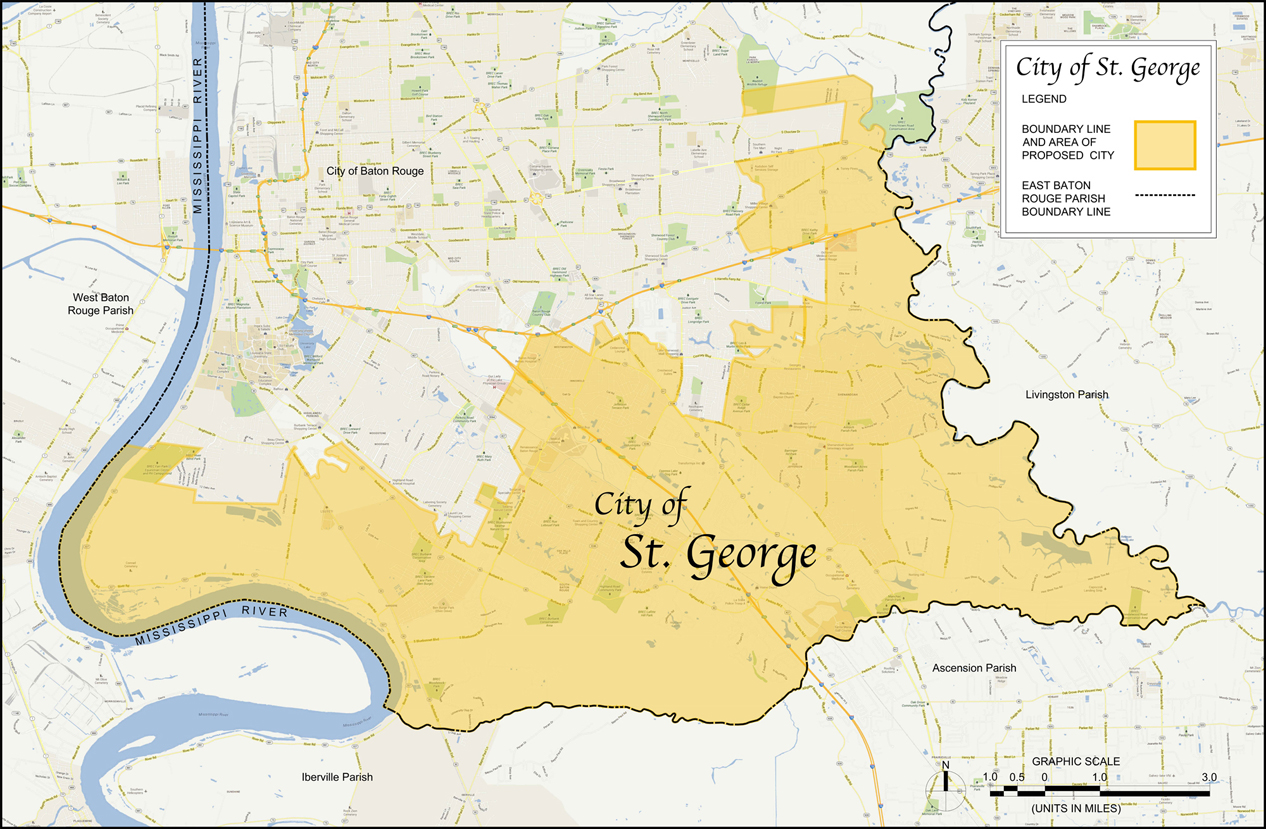
ABRAHAM: I believe in the democratic process and the right of citizens to petition their government. It seems as though these individuals have followed the law. The Secretary of State has certified their petition, and it has been confirmed by Gov. Edwards. If successful, this would change the power structure within the parish. And oftentimes changes like this bring about positive reforms. If successful, my hope would be that all parties work together for the betterment of our state and the Baton Rouge area.
EDWARDS: The voters will decide on St. George. But if the voters approve of a newly incorporated city of St. George, there should be a thoughtful, fair and equitable transition. That’s why this year I vetoed legislation that was amended on the Senate floor to limit the responsibility of St. George for liabilities and other bonded indebtedness for services that have been provided to the residents of the St. George area for decades.
RISPONE: I believe citizens should have the right to challenge government if they do not feel as though their tax dollars are being used fairly and justly. The St. George petition organizers have followed the law and earned the right to democratically vote on incorporation. I believe St. George has the potential to bring positive outcomes for East Baton Rouge Parish as a whole. Our parish is experiencing unprecedented outmigration with the exception of the Central and Zachary communities. When citizens can be confident in responsible governance, communities can grow and thrive.
What are your thoughts on the state’s Medicaid expansion in 2016? What alternatives might you propose that would encourage positive health outcomes for residents and keep emergency room expenses down?

ABRAHAM: No one in this race understands health care better than me. I’ve been a practicing physician for over 30 years and have treated thousands of Medicaid patients in one of our state’s poorest, most rural areas. Medicaid expansion is a reality, and I have no plans to repeal it. That said, the current growth trajectory for the program is not sustainable. Louisiana Department of Health’s budget is growing at a rate of $1 billion per year, faster than any other state in the country. We are on track to have 50% of all Louisiana residents on government health care. Meanwhile, Gov. Edwards has not given the Legislature or the general public any answers on how Louisiana will continue to fund this program or how much state general fund dollars will be needed. I will implement reforms that incentivize Medicaid recipients to take ownership over their health and make smarter choices about how to use the system. Private insurance plans already do this, and the government should, too.
EDWARDS: My decision to expand Medicaid on my first day in office is the easiest big decision I will ever make as governor. Medicaid expansion has given over 450,000 working Louisianans access to health care. It has created or retained 14,000 jobs, and adds roughly $2 billion to our economy. Thanks to Medicaid expansion, we haven’t seen a single rural hospital in Louisiana close while I’ve been governor. Expanding Medicaid is actually one way we solved our budget crisis. Before, the state was paying 40% of the costs of an uninsured person going to the emergency room because they had no access to care. When that same person has coverage through expanded Medicaid, Louisiana only pays 10% of the cost. It helps keep emergency room costs down by giving more people access to the preventative care that keeps them out of the emergency room. More than 325,000 Louisianans have received preventative care through Medicaid expansion. And it’s paid for entirely through a fee on the providers that administer it and a premium tax on managed care organizations, so it hasn’t taken any funding away from education, public safety and infrastructure. In fact, it has saved our state more than $300 million. But most importantly it’s saving thousands of lives. We have the lowest number of uninsured people in our state’s history. Health outcomes are improving, and we will further incentivize managed care organizations to deliver improved outcomes in new contracts currently being put in place. People constantly approach me in public to tell me how Medicaid expansion made a life-changing difference for them or a loved one.
RISPONE: The current Medicaid expansion in Louisiana is unsustainable. If we don’t make some changes, it’s going to go broke. I want to make sure we have a viable and sustainable safety net for our most vulnerable citizens for decades to come. The first thing we need to do is freeze eligibility. The program costs hundreds of millions of dollars more than what was projected. I promise to work with our congressional delegation and the federal government to ensure Louisiana has the proper safeguards in place should the U.S. Department of Health and Human Services alter the current Medicaid cost-sharing agreement. Next, we need to weed out waste and abuse, which is costing the program untold millions every year. Finally, we need to change how the system delivers care and give priority to those who need it most.
Louisiana is ranked 48th in education by the US News & World Report. Specifically, we came in with a rank of 50th in pre-K to 12 math scores. If elected, what steps might you take to improve education opportunities for children in the state?

ABRAHAM: The policies we should be focusing on are those that will directly improve student outcomes and outputs. More and more, government is not only asking teachers to do too much, but it is also burdening them with far too many mandates and rules. My goal will be to recruit and retain the very best teachers for our students and to get the state out of the way as much as possible so that those teachers can do their jobs. I want to empower our teachers, not hold them back.
I will also support programs that help create a bigger pipeline of qualified teachers, including programs providing opportunities for high school students to earn college credits toward becoming a classroom teacher. One of our recent state teachers of the year is leading that charge, and we’re already seeing positive outcomes in terms of more high school students wanting to enter the teaching profession.
One of the biggest issues holding back greater investment in our pre-K-12 students is TRRL (Teacher Retirement System of Louisiana) pension liability. For every 30.4 cents districts pay into TRSL, 26.2 cents go directly to paying off pension debt. At the same time, the system is continuing to rack up new debt. Our current system also puts Louisiana at a serious disadvantage in recruiting high-talent teachers in today’s job market. Teachers receive very few retirement benefits unless they stay on the job for 20 years or more. In today’s mobile economy, that simply isn’t competitive. Finally, I will support a robust, coordinated, statewide school choice plan for Louisiana families. Louisiana’s multiple school choice programs, including charter schools and the scholarship program, have produced positive results. Our accountability system is among the toughest in the country, and schools receiving our scholarship students are closing the achievement gap faster than traditional public schools. Most important, families are happy.
EDWARDS: When I became governor, Louisiana faced a $2 billion deficit, and we had disinvested more in higher education than every other state in the country. Last year, we brought together Republicans, Democrats and Independents to find a budget compromise, and now we’re consistently running small budget surpluses. This year, we were able to give teachers a pay raise for the first time in a decade. We increased funding for schools by $39 million and made the first net new investment in higher education in a decade.
We were also able to increase funding for early childhood education by $20 million this year, and I have said that early childhood education will be the No. 1 priority of my second term. If children don’t show up to kindergarten ready to learn, they might never catch up to their classmates.
We still have work to do on education, but after years of disinvestment and funding crises, we’re moving in the right direction. We’ll keep investing in our children in my second term.
RISPONE: Being last is never acceptable. I believe every child in Louisiana must have the right and opportunity to a quality education in order to live up to their God-given potential. We should continue to expand choice options to tailor education needs that fit the child and empower parents. We should support and reward good teachers for providing a quality education. And lastly, we should invest in vocational opportunities to provide students multiple pathways to success.
A recent survey showed around 80% of Louisiana residents are worried about the impact of climate change on their livelihoods. What’s one key initiative you would take to make sure Louisiana is better prepared for the acceleration of climate change and extreme weather events?

ABRAHAM: Louisiana’s coast is our most valuable natural resource, and the data is clear that we are losing our coastline at an alarming rate. Under Gov. Edwards, leadership changes at CPRA have significantly set back the agency, and three years after the BP settlement, not a single restoration project has been constructed.* I will make sure projects along our coast get done quickly and effectively. We will pick and implement projects based on science, not politics. And I will work closely with the people who make a living along our coast and the waters around it, including our fishermen and oystermen, monitoring projects to understand the impact they are having.
*Editor’s note: According to the state’s Coastal Protection and Restoration Authority records, nearly 40 restoration projects have been completed since the BP settlement in 2016.
EDWARDS: We have the most advanced coastal restoration and protection master plan in the country. It accounts for sea level rise, subsidence, coastal erosion—the trifecta that’s really hitting us all at one time. If the frequency of severe weather increases as some are predicting, then Louisiana may see more than our fair share of those rain events. The flood in March 2016 was deemed to be a 100-year event; the one in August 2016 was deemed to be a 500-year event. You would not typically see those within a few months of one another, so I think it’s something that we need to take seriously. That’s why we currently have more coastal restoration projects underway than at any time in our state’s history. And that’s why I worked with Congressman Garret Graves to secure funding for the overdue Comite River diversion project. It’s also why I worked with Graves and Mayor Sharon Weston Broome to commit $40 million in state funding that will draw down more than $255 million for the East Baton Rouge Flood Risk Reduction Project, which will improve drainage across the parish.
RISPONE: Coastal restoration is not an option—it’s a necessity to protect human life, our economy and the Sportsman’s Paradise we hold dear. We must continue to support the Coastal Master Plan to restore, build and maintain coastal wetlands. It is the responsibility of the state and CPRA to monitor and adapt to the changes to the ever-evolving coast and address as necessary. The restoration projects create buffers that are essential for storm defense to protect human life and build habitats for wildlife that are vital to our economy, recreation and livelihood.
In 2018, Louisiana once again claimed the highest murder rate in the country. Here in Baton Rouge, the 2018 murder rate was higher than cities like Chicago and about seven times the national average. What steps would you take to reduce this rate, and how would your actions differ from those of previous leaders?

ABRAHAM: Crime in Baton Rouge is at a crisis level. And Gov. Edwards’ criminal justice “reforms” have done nothing to solve this crisis. In fact, they have added to it by letting thousands of violent, career criminals out of jail. His reforms also did away with criminal history tiers and reduced the amount of time violent criminals have to be monitored once released. Under Gov. Edwards, Louisiana became literally the most dangerous state in America to raise a family based on FBI murder data.* There is nothing more important than keeping our families and our kids safe. When I am governor, I will not consider success to be putting fewer violent criminals behind bars. I will consider success to be less crime and safer communities. Once elected, I will immediately sit down with district attorneys, sheriffs, local police and victims groups to analyze the impact of each of Gov. Edwards’ reforms and make changes to ensure that we aren’t letting violent criminals who pose a risk to public safety back out on the street.
*Editor’s note: According to FBI data, Louisiana’s ranking for the highest murder rate in the nation predates Gov. Edwards. Louisiana has held that title since 1989, based on the latest available data up to 2017.
EDWARDS: We still have more to do, but Louisiana’s violent crime rate is decreasing. Baton Rouge’s murder rate is falling*, and violent crime is trending down in cities all across the state. In 2018, New Orleans saw its lowest murder rate since 1971; Baton Rouge, Monroe, Lafayette, Alexandria and Shreveport all saw double-digit decreases. When I took office, Louisiana had led the nation in incarceration for decades, but we weren’t safer as a result. In 2017, we brought together law enforcement, Republicans, Democrats, business, industry and faith leaders to pass common sense criminal justice reforms aimed at better rehabilitating non-violent, non-sex offenders. The early returns on our reforms are promising, and as a result we’re investing millions more in crime prevention and victims’ services. In fact, our successful reforms were used as a model by the Trump administration when they passed national bipartisan criminal justice reform last year.
*Editor’s note: At least in terms of homicides, Baton Rouge hit an all-time high in 2017 with 106 homicides. That number dipped to 87 in 2018 based on FBI and local law enforcement data.
RISPONE: We need to modernize our criminal justice system, much like we do in business. Using technological advancements and modern approaches, we can create a justice system that is more efficient and effective. Louisiana should embrace a statewide-model like the Swift and Certain probation program [adopted by the 24th Judicial District Court in Jefferson Parish in 2016] that targets high-risk individuals with hands-on supervision to allow for rapid reaction by law enforcement to intervene before a second or third crime can take place. Further, we should promote proven re-entry programs and training to make sure individuals released from prison can rejoin society as productive citizens with access to a quality job.
This article was originally published in the October 2019 issue of 225 Magazine. Editor’s note: Answers were edited for clarity and brevity.
|
|
|
